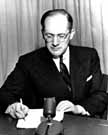
|
|
|

|

|

|

|
|
Click on an image to see a larger, more detailed picture.
|
|
|
|
|
| 1944: Desperate Acts |

|
pg. 572 |

|
|
|
|
| |
 Using his diplomatic status as a weapon for good, Carl Lutz intervened to save the lives of thousands of Jews in Budapest, Hungary, from 1942 to 1945. As Swiss consul responsible for granting visas, he issued some 50,000 Swiss passports, placing Jews under the protection of the Swiss government. Risking assassination at the hands of the SS, Lutz labored to save as many lives as possible in the last months of the war. He eventually attached himself to the November 1944 death march of 70,000 Jews, saving some by granting them Salvadorean certificates of citizenship.
Using his diplomatic status as a weapon for good, Carl Lutz intervened to save the lives of thousands of Jews in Budapest, Hungary, from 1942 to 1945. As Swiss consul responsible for granting visas, he issued some 50,000 Swiss passports, placing Jews under the protection of the Swiss government. Risking assassination at the hands of the SS, Lutz labored to save as many lives as possible in the last months of the war. He eventually attached himself to the November 1944 death march of 70,000 Jews, saving some by granting them Salvadorean certificates of citizenship.
Photo: Yad Vashem/United States Holocaust Memorial Museum Photo Archive
|
 As assistant secretary of war, John J. McCloy was a crucial voice in setting U.S. military priorities. McCloy was repeatedly asked by the War Refugee Board, the Emergency Committee to Save the Jewish People of Europe, and other groups to order the bombing of the railroad lines leading to Auschwitz and the gas chambers in the camp. McCloy refused the request, claiming erroneously that the target was outside the range of U.S. and British bombers.
As assistant secretary of war, John J. McCloy was a crucial voice in setting U.S. military priorities. McCloy was repeatedly asked by the War Refugee Board, the Emergency Committee to Save the Jewish People of Europe, and other groups to order the bombing of the railroad lines leading to Auschwitz and the gas chambers in the camp. McCloy refused the request, claiming erroneously that the target was outside the range of U.S. and British bombers.
Photo: United States Holocaust Memorial Museum Photo Archive
|
 Raphael Lemkin
Raphael Lemkin
Polish jurist Raphael Lemkin coined the term "genocide" to describe the Nazis' systematic extermination of European Jewry. The word first appeared in his 1944 publication Axis Rule in Occupied Europe, Laws of Occupation-Analysis of Government, Proposals for Redress. Lemkin was born into a Jewish family in rural Eastern Galicia and educated at the University of Lvov. After Hitler came to power, Lemkin's interest in crimes of mass murder and the persecution of minorities increased. He compiled his pathbreaking analysis of Nazi racial legislation while living in Sweden. He published it in 1944 after he arrived in the United States via a circuitous route that took him through Sweden, the USSR, Japan, and Canada. After the war, Lemkin helped the United States prosecute Nazi war criminals at Nuremberg and other war-crimes trials.
Photo: UPI / Corbis-Bettman
|
|

|

|

|

|
 November 8, 1944: Germans initiate a death march of Jews from Budapest to the Austrian border. Raoul Wallenberg's intervention saves tens of thousands of Jews.
November 8, 1944: Germans initiate a death march of Jews from Budapest to the Austrian border. Raoul Wallenberg's intervention saves tens of thousands of Jews.
|
 November 8, 1944: The Stern Gang resistance group assassinates Lord Walter Moyne, Britain's minister of state in the Middle East.
November 8, 1944: The Stern Gang resistance group assassinates Lord Walter Moyne, Britain's minister of state in the Middle East.
|
 November 8, 1944: John W. Pehle, head of the War Refugee Board who has delayed for months a request that Auschwitz be bombed, changes his mind. He argues that bombing would destroy the gas chambers as well as German factories and soldiers in the area, encourage resistance, and free prisoners. Assistant Secretary of War John J. McCloy rejects Pehle's reasoning, erroneously arguing that bombing Auschwitz will hinder the war effort.
November 8, 1944: John W. Pehle, head of the War Refugee Board who has delayed for months a request that Auschwitz be bombed, changes his mind. He argues that bombing would destroy the gas chambers as well as German factories and soldiers in the area, encourage resistance, and free prisoners. Assistant Secretary of War John J. McCloy rejects Pehle's reasoning, erroneously arguing that bombing Auschwitz will hinder the war effort.
|
|
|
|
|
| 1944: Desperate Acts |

|
pg. 572 |

|
|
The Holocaust Chronicle
© 2009 Publications International, Ltd.
|
|
